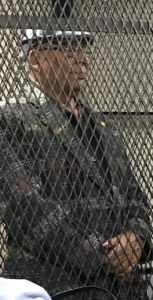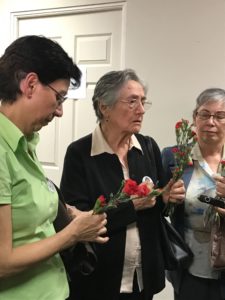The public trial in the high-profile Molina Theissen case will begin on March 1, 2018. The High Risk Court “C,” which will hear the case, notified the parties of this decision last week.
Last March, the pretrial judge charged five retired senior military officers with crimes against humanity for the illegal detention, torture, and rape of Emma Molina Theissen, and for the enforced disappearance of her 14-year-old brother, Marco Antonio Molina Theissen, in 1981.
The five officials, all retired, include two heavily decorated generals who were widely believed to be untouchable: former army chief of staff Benedicto Lucas García and Manuel Callejas y Callejas, former head of military intelligence and presumed leader of the Cofradía organized crime syndicate.

Benedicto Lucas García, retired general and former army chief of staff, observes the intermediate proceedings in the Molina Theissen case. March 2017. Photograph by Jo-Marie Burt.
The other three officials are Francisco Luis Gordillo Martínez, commander of Military Zone No. 17, where Emma was detained in Quetzaltenango in 1981; Edilberto Letona Linares, former second commander of Military Zone No. 17; and Hugo Ramiro Zaldaña Rojas, former “S-2” intelligence official of the chief of staff. The five men have been held in preventive detention since their arrest on January 6, 2016. Lucas García also faces charges in the CREOMPAZ enforced disappearance case. The opening of the public trial has been delayed as several appeals courts considered a series of legal motions filed by the defendants in the case.
Prosecutors have charged the military officers with detaining Emma illegally in a clandestine detention center located in Military Zone No. 17 in Quetzaltenango, and for her interrogation by means of physical, sexual, and psychological violence. After nearly two weeks in these circumstances, Emma managed to escape from the military prison and left the country for Mexico.
Callejas y Callejas, Zaldaña Rojas and Lucas García face additional charges for the enforced disappearance of Marco Antonio. After Emma’s escape, government prosecutors allege that military intelligence designed and carried out a special operation to recapture her. The day after her escape, military intelligence officials raided her parent’s family home. After failing to locate Emma, the intelligence personnel kidnapped Emma’s brother Marco Antonio in what prosecutors say was an act of revenge. His whereabouts remain unknown. Prosecutors allege that Zaldaña Rojas and Callejas y Callejas are responsible for the design and implementation of the military intelligence operation that resulted in Marco Antonio’s disappearance. Prosecutors accuse Lucas García of responsibility for the crime as army chief of staff at the time of the alleged crime.

Emma Theissen Alvarez (center) is the mother of Emma and Marco Antonio Molina Theissen and is a plaintiff in the case. She is flanked by her daughters Maria Eugenia Molina Theissen and Ana Lucrecia Molina Theissen. Photograph by Jo-Marie Burt.
High Risk Court “C” is presided over by Judge Pablo Xitumul de Paz, who was one of the magistrates who participated in the 2013 genocide trial against Efraín Ríos Montt and Mauricio Rodríguez Sánchez. The other two magistrates are Elvis David Hernández Domínguez and Eva María Recinos Vásquez.
The High Risk Court “C” has been in existence only a short time, since 2015. It has heard cases of corruption investigated by the Attorney General’s Office and the International Commission Against Impunity in Guatemala (CICIG), as well as cases of drug trafficking and gang-related criminal activity. Last November, Judge Xitumul publicly denounced death threats directed against him and the other members of High Risk Court “C.” He said he presumed that they had come from one or more of the individuals whom the tribunal had convicted in recent months. Just a few months later, in January 2017, Judge Xitumul’s son was killed in an armed attack.
Jo-Marie Burt is an Associate Professor of Political Science and Latin American Studies at George Mason University. She is also a Senior Fellow at the Washington Office on Latin America (WOLA). Paulo Estrada is a human rights activist, archaeology student at San Carlos University, and civil party in the Military Diary case.
